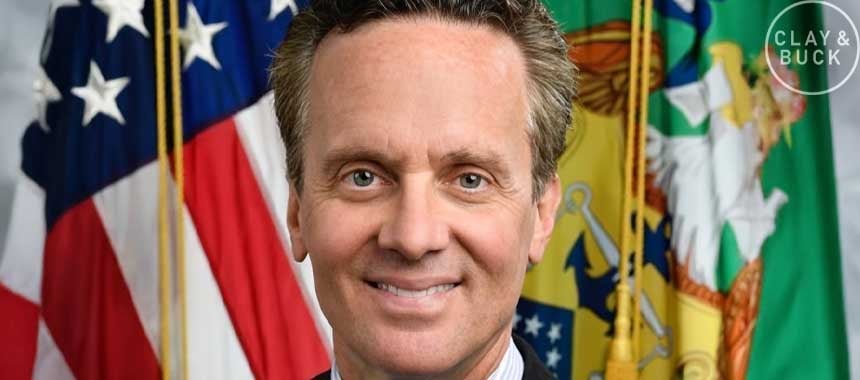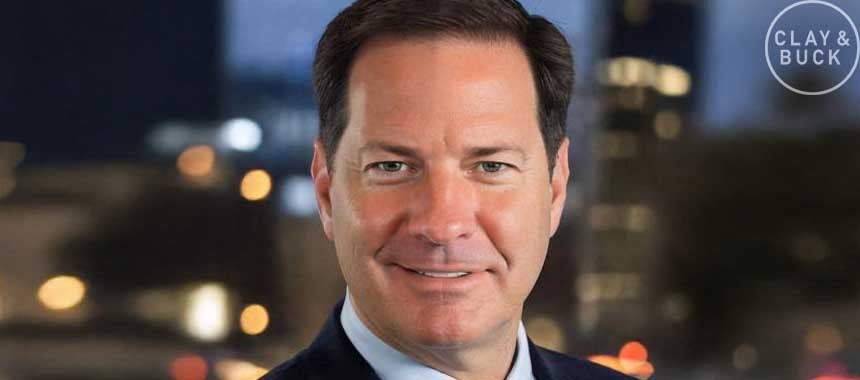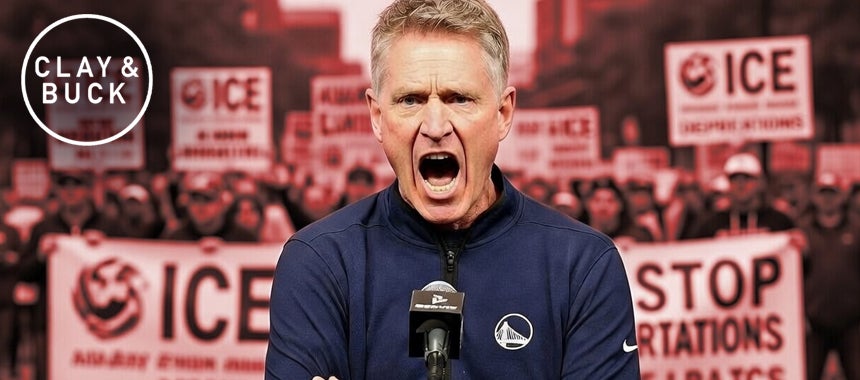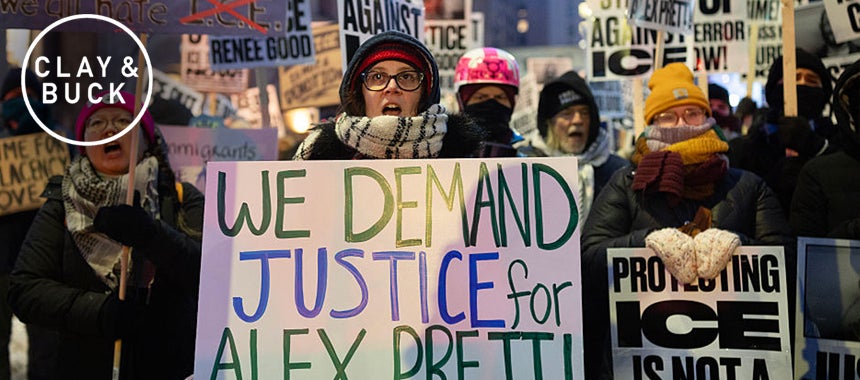In Post-Pandemic America, Red States Boom
5 Jul 2022
BUCK: If someone offered you a swap for your house, double its value but in Santa Monica, in California, would you go for it? Double the value of your current house, but you have to live in Santa Monica, California?
CLAY: To leave Nashville?
BUCK: No, no, no. Talking about Florida, Florida, the Florida house.
CLAY: I would not. No, I wouldn’t. I wouldn’t take it.
BUCK: I ask because this is what people all across America are looking at right now, kind of in reverse, cheaper housing, better housing for them in the red states. Wall Street Journal has a big piece out today that really goes in to the numbers: “Red States Are Winning the Post-Pandemic Economy,” and we’ve been talking about this all along. Of course, states that look at the reality of what we can and can’t do against covid. The truth all along was that basically covid was just gonna rip through the country and you try to protect seniors, get them the care you can, get them shots ’cause for them, at higher risk.
 Fine, shots should be their choice but everything else was a total waste. Everything else was a total — and actually worse than a waste. Lockdowns made everything worse. But now we’re seeing the economic reality of this play out. Inflation, of course, very high because of all the just unprecedented spending that was going on, but at a state to state level, the pandemic, as the Journal says here, has changed geography of the American economy. Short version of this. We should dive into this, Clay, because now we’re seeing the emergence — and put aside presidential aspirations for a second — of two state leader titans in their respective camps.
Fine, shots should be their choice but everything else was a total waste. Everything else was a total — and actually worse than a waste. Lockdowns made everything worse. But now we’re seeing the economic reality of this play out. Inflation, of course, very high because of all the just unprecedented spending that was going on, but at a state to state level, the pandemic, as the Journal says here, has changed geography of the American economy. Short version of this. We should dive into this, Clay, because now we’re seeing the emergence — and put aside presidential aspirations for a second — of two state leader titans in their respective camps.
I know people say, don’t call Gavin Newsom a titan. Oh, he’s a slimy, disingenuous titan, but he’s a big deal in Democrat circles. We’ve got Ron DeSantis, you know, it’s like choose your champion, Ron DeSantis, the Republican in Florida, Gavin Newsom in California. We’ll dive into this in a second ’cause Newsom is trying to pick a fight. Unlike Buck on vacation in Asheville, not try to pick a fight. Newsom is. Look at it there: Newsom is trying to pick a fight with Ron DeSantis. But here’s the basic numbers, Clay. I just wanted to hear, ’cause you’re already longtime, born and raised Tennessee.
CLAY: I’m a red state guy.
BUCK: And you’re a red state guy through and through. So, I’ve witnessed this transformation from the perspective of state that has hemorrhaged people. You witnessed the opposite effect. Guess what, everybody? The three states that have lost the most people are — anyone want to guess? Pretty much some of the most Democratic states, really the Democrat stronghold states. New York, Illinois, California.
CLAY: Yep.
BUCK: The states that have got the most residents are (drum roll), Florida, Texas — love Texas — and North Carolina where I was just over this past weekend. You’ve had 46 million people move in the period of the pandemic through February of 2021, Clay — 46 million people have moved. And what we’re seeing is that this is not a temporary phenomenon. This is a change in where people want to live, raise their families, and how they want to be governed.
 CLAY: Buck, 46 million, let’s put that in context: 330-ish million people who live in the United States, we’re talking about roughly 15% of Americans have relocated since covid started. And overwhelmingly they’ve moved to red states. I had someone really smart in the financial industry text me the other day, and he said, “I don’t see how we’re not moving towards two different countries.” He’s not somebody who’s, like, a crazy, “I’m trying to draw attention to myself,” outlandish speaker. Someone privately texted me and said, “I feel like we’re almost to the point now,” and I think that 46 million is a part of this, “where if you live in a blue state, you have to just say, ‘Peace out. I’m moving to a red state.’” And, flip side, if you’re a super blue person and you find yourself living in a red state, “Peace out. I’m moving too.” Red is getting redder and blue is getting bluer in virtually every political context. And how does that play itself out is such an incredibly difficult question to answer.
CLAY: Buck, 46 million, let’s put that in context: 330-ish million people who live in the United States, we’re talking about roughly 15% of Americans have relocated since covid started. And overwhelmingly they’ve moved to red states. I had someone really smart in the financial industry text me the other day, and he said, “I don’t see how we’re not moving towards two different countries.” He’s not somebody who’s, like, a crazy, “I’m trying to draw attention to myself,” outlandish speaker. Someone privately texted me and said, “I feel like we’re almost to the point now,” and I think that 46 million is a part of this, “where if you live in a blue state, you have to just say, ‘Peace out. I’m moving to a red state.’” And, flip side, if you’re a super blue person and you find yourself living in a red state, “Peace out. I’m moving too.” Red is getting redder and blue is getting bluer in virtually every political context. And how does that play itself out is such an incredibly difficult question to answer.
BUCK: I just wish I had taken… I hope I had borrowed money from distant relatives to, like, buy real estate in Nashville and San Antonio and places like that ten years ago ’cause, my gosh. It has just been a crazy ride.
CLAY: When I went away to college and I told people… I went away to college in Washington, D.C., with all East Coast kids who went there. When I told people I was from Tennessee, they were like, “Do you have running water there?” This is like 2000, right, late nineties? It was as if I’d lived that cultural backwater.
BUCK: Did you hide your banjo from them at least for the first few months?
CLAY: Hide the banjo. I had to be like, “Man, these moving stairs are unbelievable!” I’d never seen an escalator before. Now, when I started OutKick in 2011, everybody told me, “Hey, if you’re gonna run a media company, you have to move to New York and L.A.” Now everybody is moving to where I live in Tennessee, and you look around Nashville, The Daily Wire is there, Parler is there, every media it feels like iHeart’s got one of their main studios, our bosses, right downtown in Nashville. Everybody, it feels like, is moving to Florida, Texas, Tennessee, the places they all told us, hey, you can’t live there and make a living in media.
 BUCK: Those are places that could rely on… This goes to the heart of what we’re seeing. There was a time when if you want to have certain kinds of jobs or work for certain companies, you had to be there. Now, there’s still some truth to it. The pandemic and remote work hasn’t entirely changed it, but this Wall Street Journal piece does go into how 30% of workers they surveyed are gonna be in some kind of a hybrid model, which certainly means much bigger commute is way more doable, right?
BUCK: Those are places that could rely on… This goes to the heart of what we’re seeing. There was a time when if you want to have certain kinds of jobs or work for certain companies, you had to be there. Now, there’s still some truth to it. The pandemic and remote work hasn’t entirely changed it, but this Wall Street Journal piece does go into how 30% of workers they surveyed are gonna be in some kind of a hybrid model, which certainly means much bigger commute is way more doable, right?
If you’re gonna go in to work once or twice a week, maybe you drive an hour and a half, two hours both ways, you don’t really care if you have two or three days where you’re not commuting at all. But even beyond that now, if you can work remotely for some of the entertainment industry, for investment banking and financial services, for media, news media, I mean, all these things, it changes people’s concepts of where you go. New York City used to basically have this captive audience of, do you want to work at the most elite finance institutions?
CLAY: You have to be there.
BUCK: You had to be in New York City, right, you had to be here. You want to work at Goldman Sachs, it wasn’t like, oh, yeah, I’m gonna work remote from Fiji and, you know, work for Goldman. Now these things are changing. So that’s a big part of it.
Recent Stories

Joe Lavorgna, Counselor to Scott Bessent, Explains Why Trump Accounts Are a Game Changer
The highly respected economist and U.S. Treasury official on the soaring Trump economy.

Inside Trumpworld’s Next Year: Clay & Buck’s Candid Talk With Mark Halperin
The veteran political journalist shares his reporting and insights.

Steve Kerr Slams "Misinformation" While Spreading It
The NBA coach is an avowed and vocal leftist -- and he's always wrong.

Will the Minneapolis Chaos Spread?
C&B warn that the danger now is that the left's bought-and-paid-for sabotage of ICE will spread to other cities.






